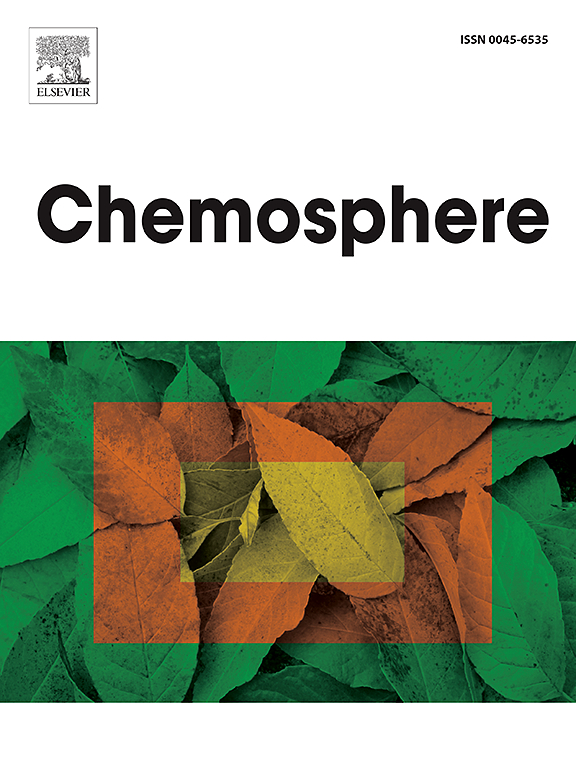Reduction of tobacco alkaloid bioaccumulation in pea shoots: A comparative study of biochar derived from cow dung and maize straw
IF 8.1
2区 环境科学与生态学
Q1 ENVIRONMENTAL SCIENCES
引用次数: 0
Abstract
Tobacco alkaloids in tobacco-cultivated soils pose potential risks for succeeding crops, due to their allelopathy and toxicity. Effects of biochar on the dissipation of tobacco alkaloids in soil-crop systems remain poorly understood. In this study, a 40-day pot experiment was conducted to explore the effect of cow dung biochar (CDBC) and maize straw biochar (MSBC) on the uptake of nicotine and nornicotine by pea (Pisum sativum L.) and their dissipation in an agricultural soil. The results revealed that the bioaccumulation of nicotine and nornicotine by pea shoots in the soils added with CDBC and MSBC at 1.5% and 3.0% significantly decreased by 46.97–79.13% and 33.64–71.59%, respectively. CDBC more effectively decreased the uptake and bioaccumulation of nicotine and nornicotine by pea shoots than MSBC due to the higher soil pH and nutrient content. In addition, the enhanced relative abundances of soil nicotine-degrading bacteria belonging to the genera Arthrobacter and Gemmatimonas also contributed to the decreasing uptake of nicotine by pea plants. The decreased bioavailability in the soils due to the increased adsorption was the key factor for the reduced bioaccumulation of tobacco alkaloids. This study provides guidance to protect subsequent crops in tobacco-cultivated soil from tobacco alkaloids with biochar.

减少烟草生物碱在豌豆嫩芽中的生物累积:牛粪和玉米秸秆制成的生物炭的比较研究。
烟草栽培土壤中的烟草生物碱因其等位效应和毒性而对后茬作物构成潜在风险。生物炭对土壤-作物系统中烟草生物碱消散的影响仍然知之甚少。本研究进行了一项为期 40 天的盆栽实验,以探讨牛粪生物炭(CDBC)和玉米秸秆生物炭(MSBC)对豌豆(Pisum sativum L.)吸收烟碱和烟碱及其在农业土壤中消散的影响。结果表明,在添加了 1.5% CDBC 和 3.0% MSBC 的土壤中,豌豆芽对尼古丁和烟碱的生物累积量分别显著降低了 46.97%-79.13% 和 33.64%-71.59% 。由于土壤 pH 值和养分含量较高,CDBC 比 MSBC 更有效地降低了豌豆芽对尼古丁和烟碱的吸收和生物累积。此外,土壤中属于节杆菌属(Arthrobacter)和革马提那菌属(Gemmatimonas)的尼古丁降解细菌的相对丰度增加,也有助于降低豌豆植物对尼古丁的吸收。土壤中生物利用率的降低是烟草生物碱生物累积减少的关键因素。这项研究为利用生物炭保护烟草栽培土壤中的后茬作物免受烟草生物碱的危害提供了指导。
本文章由计算机程序翻译,如有差异,请以英文原文为准。
求助全文
约1分钟内获得全文
求助全文
来源期刊

Chemosphere
环境科学-环境科学
CiteScore
15.80
自引率
8.00%
发文量
4975
审稿时长
3.4 months
期刊介绍:
Chemosphere, being an international multidisciplinary journal, is dedicated to publishing original communications and review articles on chemicals in the environment. The scope covers a wide range of topics, including the identification, quantification, behavior, fate, toxicology, treatment, and remediation of chemicals in the bio-, hydro-, litho-, and atmosphere, ensuring the broad dissemination of research in this field.
 求助内容:
求助内容: 应助结果提醒方式:
应助结果提醒方式:


